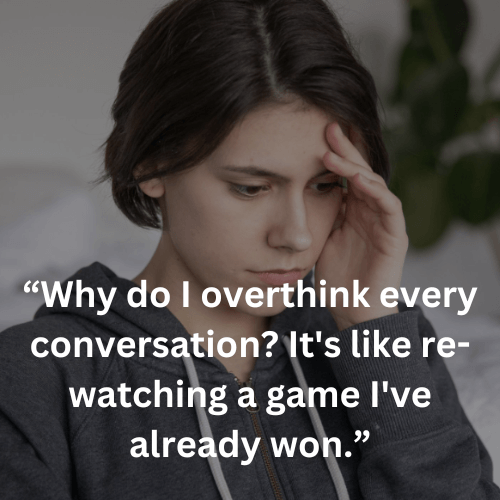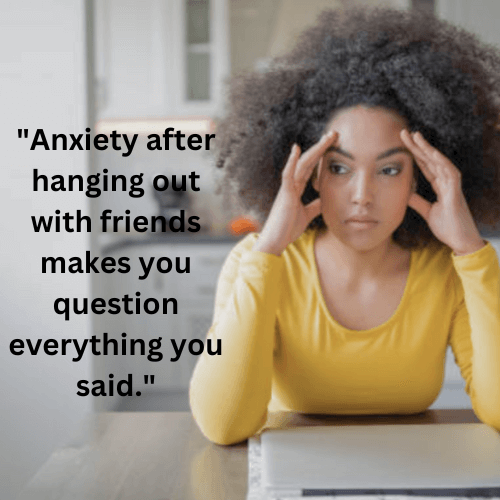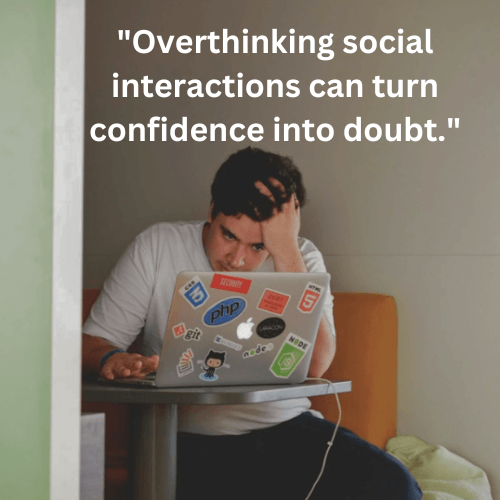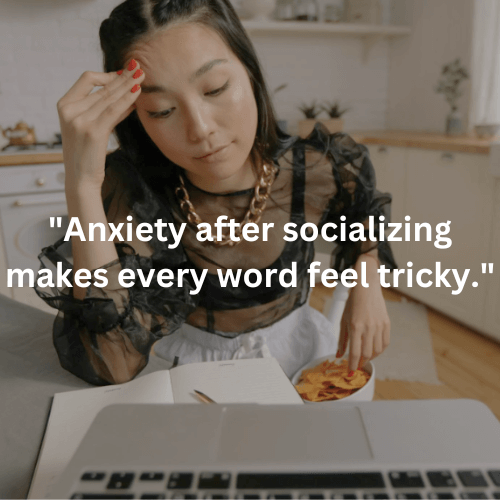Last updated on October 30th, 2024 at 08:20 am
“What is it like to overthink a conversation?”
Overthinking conversations feels like watching a movie on repeat but with a new ending every time. You replay every word, tone, and gesture, making up all sorts of what-ifs.
Overthinking conversations turns a simple chat into a big deal.
Take Emma, for example. After a fun night out with friends, she spent hours worrying about every little detail. Did she laugh too loudly at that joke? Was her comment about the movie too critical? Did her friend look away because she was bored or just distracted? Instead of enjoying the memories, Emma was trapped in a spiral of second-guessing and self-doubt.
Overthinking makes us doubt ourselves. But here’s the thing – most of the time, others don’t even notice. They’re too busy enjoying the moment.
“Why do I overthink every conversation?”
Our brains love to analyze every word, gesture, and silence, looking for hidden meanings that probably aren’t there. It’s like playing a hard game of “What Did They Really Mean?” Maybe it’s because we want to make a good impression or avoid awkward moments.
But most people are too busy overthinking their own conversations to notice yours.
So, next time you replay that awkward “bye” hug in your head, remember: Everyone is on the same boat. Relax, and give your mind a break—it needs it!
Anxiety vs. Social Anxiety: What’s the Difference?
So, what’s the difference between plain old anxiety and social anxiety?
Anxiety
Anxiety is your brain’s overactive alarm system. It’s the feeling you get before a big presentation, during a tough exam, or when you’re watching a horror movie alone at night. It’s your body’s way of saying, “Hey, something important is happening, and I need you to be ready!”
It can strike anytime, whether you’re at work, at home, or trying to figure out how to make friends with social anxiety.
Social Anxiety Disorder
Social Anxiety Disorder is more than just feeling anxious; it’s like anxiety’s overly dramatic cousin, surfacing specifically during social interactions. While regular anxiety can arise in various situations, social anxiety is triggered by social settings and the fear of being judged.
Imagine the nervousness before speaking to a crowd, but experienced even during casual chats. It’s that persistent voice whispering, “What if I say something stupid?” or “They’re all judging me.”
This disorder can leave you feeling anxious after hanging out with friends, replaying every word and action, and fearing you did something wrong.
Social anxiety affects many areas of your life, making it hard to interact with people every day and lowering your overall quality of life.
If you need therapy, take a look at what kind of therapy you need.

“How to stop overthinking past conversations” 3 Effective Tips
“I can’t hold conversations without overthinking them afterward!” This you? And, are you always feeling anxious after social interaction? Below are 3 tips to calm the mental chaos you might have.
1. Be like Socrates, reflect on the conversation. Is it true?
Overthinking social interactions and conversations is like having a personal critic who never takes a day off. But here’s a clever trick to quiet that pesky inner critic: use the Socratic method.
Yes, that ancient Greek guy, Socrates, has got your back!
The Socratic method is all about asking questions to challenge your thoughts.
It’s like having a mini-debate with yourself to see if what you’re stressing about is really true. Think of it as a mental filter to sift out the nonsense from reality.
Questions to ask yourself when you’re spiraling into overthinking:
“Is this thought based on facts or feelings?”
- Example: “I think they were annoyed with me because they didn’t laugh at my joke.” Is this a fact or just how you felt at the moment?
“What evidence do I have to support this thought?”
- Example: “I’m sure they think I’m boring.” Really? Did they say that, or are you just assuming?
“Have I ever felt this way before and was I right then?”
- Example: “I always mess up conversations.” Reflect on past interactions. Were they really all disasters, or are you being too hard on yourself?
“What’s the worst that could happen?”
- Example: “What if they think I’m awkward?” Okay, so what’s the worst outcome? They think you’re awkward. And then? Life goes on.
“What advice would I give a friend in this situation?”
- Example: If your friend was overthinking, what would you tell them? Probably something kinder and more rational than what you’re telling yourself.
By using these questions:
- You can dissect your thoughts and see them for what they are, often just exaggerated worries
- It’s like turning on the lights in a dark room—you realize the scary shadows are just coats hanging on a chair.
Next time you catch yourself overthinking a conversation, channel your inner Socrates. Challenge your thoughts, ask the right questions, and move past the anxiety.

2. When in doubt … ask for a sanity check!
When you’re stuck overthinking social interactions, get some objective feedback from a friend or counselor.
Think of it as getting a fresh perspective to see if you’re thinking straight.
Experiencing anxiety after socializing is common. And talking to someone else can provide the reality check you need. Friends or counselors can offer insights you might have missed and reassure you that your worries are, more often than not, just that—worries.
Plus, they can provide that much-needed outside perspective to break the cycle of being anxious after social interaction.
Here’s how to go about it:
Choose Someone You Trust: Pick a friend or counselor who is honest but kind, someone who will give you constructive feedback without making you feel worse.
Be Specific: When you ask for feedback, be clear about what you’re worried about. Instead of saying, “I think I messed up,” explain the situation and what exactly you’re concerned about.
Listen Open-Mindedly: This is crucial. Be ready to hear things that might not match your perception. Remember, the goal is to get a reality check, not just validation of your worries.
Reflect on the Feedback: Take some time to think about the feedback you receive. Does it change your perspective? Often, you’ll find that the situation wasn’t as bad as you thought, or that you actually handled it quite well.
So, next time you find yourself spiraling into a replay of a social interaction, reach out and get a second opinion.

3. Mindfulness is your superpower: Goodbye to overthinking…
Overthinking social interactions is when your mind replays every word and gesture, leaving you with anxiety after socializing.
But here’s a clever trick to calm the storm: practice mindfulness. Stay connected to and calm in the moment. It can help you break free from the cycle of overthinking and bring more peace into your life.
Here’s how to go about it:
Start with Your Breath: Take a few deep breaths. Focus on the sensation of the air entering and leaving your body. This simple act can help center your mind and bring you back to the present moment.
Notice Your Surroundings: Pay attention to what’s around you. What can you see, hear, and feel right now? Engaging your senses pulls your focus away from overthinking social interactions.
Accept Your Thoughts: Instead of fighting your thoughts, acknowledge them without judgment. If you think, “I can’t have conversations without overthinking them afterwards,” recognize this thought and then let it pass.
Stay Present in Conversations: When you’re talking to someone, focus on truly listening and engaging in the moment. This reduces the likelihood of falling into the trap of social anxiety overthinking conversations later on.
Practicing mindfulness keeps you anchored in the present, making it easier to handle social interactions without falling into a loop of anxiety.

FAQs about Overthinking Conversations
How to Make Friends with Social Anxiety
Making friends with social anxiety can feel like climbing a mountain, but start small—say hi, smile, and be yourself. Practice in low-pressure settings and remember, everyone feels awkward sometimes.
I Have Anxiety After Hanging Out with Friends
Feeling anxious after hanging out with friends? It’s like a social hangover. Take a deep breath, remind yourself that you did great, and give your mind a break—you deserve it!
Is Overthinking a Trauma Response?
Overthinking can be a trauma response like your brain trying to keep you safe by analyzing everything. It’s a sign to be kind to yourself and maybe talk to a professional for support.
Is It Normal to Overthink Social Interactions?
Yes, it’s normal to overthink social interactions. Everyone has their own inner critic; yours just likes to chat more. The key is to not let it steal the show.
Why Am I Overthinking Social Interactions?
You’re overthinking social interactions because your brain loves playing detective, trying to decode every detail. It’s a common habit, but remember: most people are too busy overthinking their own interactions to worry about yours.
I have anxiety after hanging out with friends
Yes, it’s normal to feel anxious after hanging out with friends. Your inner critic just loves a good chat session afterward. The key is to remind yourself that everyone has these moments. Distract yourself with a hobby, focus on the positives from your time together, and remember: your friends aren’t replaying the night like you are. Don’t let your inner critic steal the show.
How to improve conversations?
Prepare Talking Points
Think of some general talking points as your secret weapon for social success. Imagine you’re Batman and these topics are your utility belt gadgets—ready to save you from any conversational catastrophe.
Jot down a few things you love chatting about: the latest binge-worthy series, your wild cat escapades, or that mind-blowing book you just finished.
Just steer clear of turning it into a script, or you might end up sounding like a customer service bot. A little prep goes a long way in boosting your confidence and keeping the overthinking gremlins at bay.
Have Conversation Starters
Ever found yourself in a black hole of awkward silence? Arm yourself with some quirky conversation starters.
“What’s the weirdest food you’ve ever tried?” or “If you could have any superpower, what would it be?” can be your trusty icebreakers. Think of them as conversational dynamite, ready to blast through the ice when your brain decides to take a coffee break. They’re not set in stone, but they’ll give you that much-needed nudge when your mind draws a blank.
Practice in Small Ways
Mastering the art of conversation is like becoming a Jedi—you need to start with the basics before facing Darth Vader.
Begin with small, everyday interactions: chat with the barista about their favorite coffee blend, make small talk with a coworker about their weekend plans, or strike up a conversation with your neighbor about their garden.
These mini-social workouts build your confidence, making those larger interactions feel less like a Death Star trench run.
How to Avoid Overthinking Conversations:
Find Your Post-Chat Zen
Why do we overthink every conversation? It’s like our brains have their own post-social after-party where anxiety is the uninvited guest.
Here’s the deal: overthinking social interactions is common, and you’re not alone in feeling anxious after socializing. Whether you’re wondering “How to stop overthinking conversations” or “Why do I overthink every conversation,” the trick is to break the cycle.
Try to focus on the positives, remember that your friends aren’t dissecting your words like you are, and engage in activities that distract your mind.
Social anxiety overthinking conversations is tough, but you can find your post-chat zen. Remember, everyone experiences anxiety after hanging out with friends now and then.
With a little practice, you’ll master how to stop overthinking social interactions and start enjoying your social life without mental replays.
What Can You Do Right Now?
Join us and get our free Toolkit. It includes a mini-course and a guide on how to talk to others.
Check out our “Next Level Conversation” course. Joining us, taking this course, or just reading our posts will help you. You won’t stress over social skills anymore. You’ll feel confident and know what to say.
